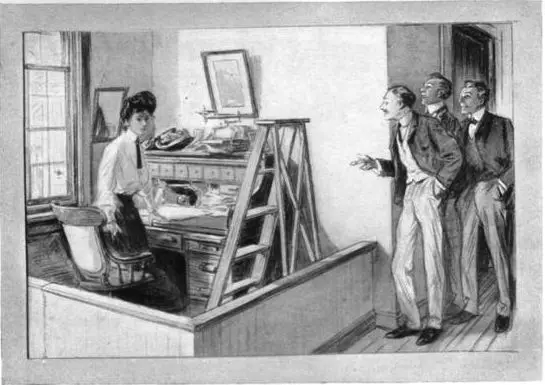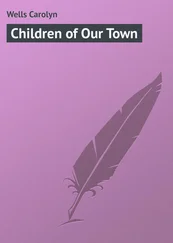William White - In Our Town
Здесь есть возможность читать онлайн «William White - In Our Town» — ознакомительный отрывок электронной книги совершенно бесплатно, а после прочтения отрывка купить полную версию. В некоторых случаях можно слушать аудио, скачать через торрент в формате fb2 и присутствует краткое содержание. Жанр: foreign_prose, foreign_antique, на английском языке. Описание произведения, (предисловие) а так же отзывы посетителей доступны на портале библиотеки ЛибКат.
- Название:In Our Town
- Автор:
- Жанр:
- Год:неизвестен
- ISBN:нет данных
- Рейтинг книги:5 / 5. Голосов: 1
-
Избранное:Добавить в избранное
- Отзывы:
-
Ваша оценка:
- 100
- 1
- 2
- 3
- 4
- 5
In Our Town: краткое содержание, описание и аннотация
Предлагаем к чтению аннотацию, описание, краткое содержание или предисловие (зависит от того, что написал сам автор книги «In Our Town»). Если вы не нашли необходимую информацию о книге — напишите в комментариях, мы постараемся отыскать её.
In Our Town — читать онлайн ознакомительный отрывок
Ниже представлен текст книги, разбитый по страницам. Система сохранения места последней прочитанной страницы, позволяет с удобством читать онлайн бесплатно книгу «In Our Town», без необходимости каждый раз заново искать на чём Вы остановились. Поставьте закладку, и сможете в любой момент перейти на страницу, на которой закончили чтение.
Интервал:
Закладка:
The Young Prince had the sense to know the truth and the courage to write it. This is the essence of the genius that is required to make a good newspaper man. No paper has trouble getting reporters who can hand in copy that records events from the outside. Any blockhead can go to a public meeting and bring in a report that has the words "as follows" scattered here and there down the columns. But the reporter who can go and bring back the soul of the meeting, the real truth about it—what the inside fights meant that lay under the parliamentary politenesses of the occasion; who can see the wires that reach back of the speakers, and see the man who is moving the wires and can know why he is moving them; who can translate the tall talking into history—he is a real reporter. And the Young Prince was that kind of a youth. He went to the core of everything; and if we didn't dare print the truth—as sometimes we did not—he grumbled for a week about his luck. As passionately as he loved his clothes, he was always ready to get them dirty in the interests of his business.
For three years his nimble feet pounded the sidewalks of the town. He knew no business hours, and ate and slept with his work. He never ceased to be a reporter—never took off his make-up, never let down from his exalted part. One day he fell sick of a fever, and for three weeks fretted and fumed in delirium. In his dreams he wrote pay locals, and made trains, and described funerals, got lists of names for the society column, and grumbled because his stuff was cut or left over till the next day. When he awoke he was weak and wan, and they felt that they must tell him the truth.
The doctor took the boy's hands and told him very simply what they feared. He looked at the man for a moment in dumb wonder, and sighed a long, tired sigh. Then he said: "Well, if I must, here goes"—and turned his face to the wall and closed his eyes without a tremor.
And thus the Young Prince went home.
III
The Society Editor
They say that in the newspaper offices of the city men work in ruts; that the editorial writer never reports an item, no matter how much he knows of it; that a reporter is not allowed to express an editorial view of a subject, even though he be well qualified to speak; but on our little country daily newspaper it is entirely different. We work on the interchangeable point system. Everyone writes items, all of us get advertising and job-work when it comes our way, and when one of us writes anything particularly good, it is marked for the editorial page. The religious reporter does the racing matinée in Wildwood Park, and the financial editor who gets the market reports from the feed-store men also gets any church news that comes along.
The only time we ever established a department was when we made Miss Larrabee society editor. She came from the high school, where her graduating essay on Kipling attracted our attention, and, after an office council had decided that a Saturday society page would be a paying proposition.
At first, say for six months after she came to the office, Miss Larrabee devoted herself to the accumulation of professional pride. This pride was as much a part of her life as her pompadour, which at that time was so high that she had to tiptoe to reach it. However she managed to keep it up was the wonder of the office. Finally, we all agreed that she must use chicken-fence. She denied this, but was inclined to be good-natured about it, and, as an office-joke, the boys used to leave a step-ladder by her desk so that she could climb up and see how her top-knot really looked. Nothing ruffled her spirits, and we soon quit teasing her and began to admire her work. In addition to filling six columns of the Saturday's paper with her society report in a town where a church social is important enough to justify publishing the names of those who wait on the tables, Miss Larrabee was a credit to the office.

As an office joke the boys used to leave a step-ladder by her desk so that she could climb up and see how her top-knot really looked
She was always invited to the entertainments at the homes of the Worthingtons and the Conklins, who had stationary wash-tubs in the basements of their houses, and who ate dinner instead of supper in the evening; and when she put on what the boys called her trotting harness, her silk petticoats rustled louder than any others at the party. One day she suddenly dropped her pompadour and appeared with her hair parted in the middle and doused over her ears in long, undulating billows. No other girl in town came within a quarter of an inch of Miss Larrabee's dare. When straight-fronts became stylish, Miss Larrabee was a vertical marvel, and when she rolled up her sleeves and organized a country club, she referred to her shoes as boots and took the longest steps in town. But with it all she was no mere clothes-horse. We drilled it into her head during her first two weeks that "society" news in a country town means not merely the doings of the cut-glass set, but that it means as well the doings of the Happy Hoppers, the Trundle-Bed Trash, the Knights of Columbus, the Rathbone Sisters, the King's Daughters, the Epworth League, the Christian Endeavourers, the Woman's Relief Corps, the Ladies' Aid and the Home Missionary Societies, Miss Nelson's Dancing Class, the Switchmen's annual ball—if we get their job-work—and every kindred, every tribe, except such as gather in what is known as "kitchen sweats" and occasionally send in calls for the police. When Miss Larrabee got this into her head she began to groan under her burden, and by the end of the year, though she had great pride in her profession, she affected to loathe her department.
Weddings were her especial abominations. When the first social cloud appeared on the horizon indicating the approach of a series of showers for the bride which would culminate in a cloudburst at some stone church, Miss Larrabee would begin to rumble like distant thunder and, as the storm grew thicker, she would flash out crooked chain-lightning imprecations on the heads of the young people, their fathers and mothers and uncles and aunts. By the day of the wedding she would be rolling a steady diapason of polite, decolourised, expurgated, ladylike profanity.
While she sat at her desk writing the stereotyped account of the event, it was like picking up a live wire to speak to her. As she wrote, we could tell at just what stage she had arrived in her copy. Thus, if she said to the adjacent atmosphere, "What a whopper!" we knew that she had written, "The crowning glory of a happy fortnight of social gatherings found its place when–" and when she hissed out, "Mortgaged clear to the eaves and full of installment furniture!" we felt that she had reached a point something like this: "After the ceremony the gay party assembled at the palatial home." In a moment she would snarl: "I am dead tired of seeing Mrs. Merriman's sprawly old fern and the Bosworth palm. I wish they would stop lending them!" and then we realised that she had reached the part of her write-up which said: "The chancel rail was banked with a profusion of palms and ferns and rare tropical plants." She always groaned when she came to the "simple and impressive ring ceremony." When she wrote:
"The distinguished company came forward to offer congratulations to the newly-wedded pair," she would say as she sharpened her pencil-point: "There's nothing like a wedding to reveal what a raft of common kin people have," and we knew that it was all over and that she was closing the article with: "A dazzling array of costly and beautiful presents was exhibited in the library," for then she would pick up her copy, dog-ear the sheets, and jab them on the hook as she sighed: "Another great American pickle-dish exhibit ended."
Читать дальшеИнтервал:
Закладка:
Похожие книги на «In Our Town»
Представляем Вашему вниманию похожие книги на «In Our Town» списком для выбора. Мы отобрали схожую по названию и смыслу литературу в надежде предоставить читателям больше вариантов отыскать новые, интересные, ещё непрочитанные произведения.
Обсуждение, отзывы о книге «In Our Town» и просто собственные мнения читателей. Оставьте ваши комментарии, напишите, что Вы думаете о произведении, его смысле или главных героях. Укажите что конкретно понравилось, а что нет, и почему Вы так считаете.












